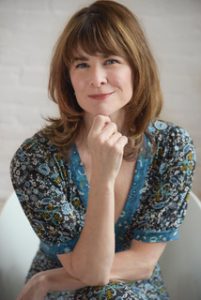|
RCBJ-Audible (Listen For Free)
|
Editor’s Note: The arts are a significant thread in the fabric of Rockland County. They inspire, enrich, and chronicle our lives. They also play a role in our economic well-being; theater, writing, dance, crafts draw us to spaces. They invite strangers to share in our bounty. They are an indelible contribution. Welcome again, Christine Potter, a poet, to RCBJ.
Rebecca Watkins, A High-School Teaching Poet
By Christine Potter
 There are two things all retired school teachers share: anxiety dreams in August and less- than-glorious memories of the classroom in late spring. My department chair at Clarkstown North used to call the cold, rainy days Rockland County endured this past May “sound academic weather,” but verily I say unto you, hot or cold, kids do not want to be in school after the leaves come out. I speak from experience. One late June afternoon, I put out a locker fire with my classroom extinguisher to the cheers of the most spirited and difficult class I ever had the honor of dragging through Romeo and Juliet. No, the locker wasn’t in my classroom, but it was right next to it. The scent of burning trapper-keepers was the first clue. Good times!
There are two things all retired school teachers share: anxiety dreams in August and less- than-glorious memories of the classroom in late spring. My department chair at Clarkstown North used to call the cold, rainy days Rockland County endured this past May “sound academic weather,” but verily I say unto you, hot or cold, kids do not want to be in school after the leaves come out. I speak from experience. One late June afternoon, I put out a locker fire with my classroom extinguisher to the cheers of the most spirited and difficult class I ever had the honor of dragging through Romeo and Juliet. No, the locker wasn’t in my classroom, but it was right next to it. The scent of burning trapper-keepers was the first clue. Good times!
So I have great sympathy for June’s poet, an English teacher at Clarkstown South, Rebecca Watkins. Rebecca is still very much on active duty in the great army of public literacy. Teaching English and writing poetry might seem a natural match-up, but in truth it’s a tough balancing act. My eyes often stung by the end of the day from processing so much language. Rebecca reports the same thing. She says she was at first “mentally exhausted” by day’s end, writing most of her poetry on summers and breaks. More recently, she’s been getting up just after 4 AM and enjoying the quiet then as writing time. I nodded hard when she shared that with me. My favorite writing time used to be right after I found out I had a snow day, around 5 AM, usually. Writing when everyone else is asleep is magical.
Originally from Ohio, Rebecca was first drawn to New York City, but landed in Rockland County, which provided her a career, a beautiful place to live, the Hudson River, and her husband! She has lived here for two decades. I flat-out love this poem of hers:
Birthright
What does a girl want from her mother
besides words, stones, and
instructions for their use?
The women I came from crawled
under a sky that would never be theirs
stealing crumbs of light yearning for more.
They told me not to fling the window open
searching the night skies for the missing pieces of myself.
They told me a woman eats her sins, swallowing the pain of others.
My mother buried weapons under her tongue
to work in a man’s world.
My grandmother was an artist, had eleven children, lost five more,
picked up her paintbrush again right before she died.
My great grandmother whose long hair reached the floor
cut it all off to defy the husband who loved it.
They began the story that I will finish.
Why is it that when a woman lights herself on fire
it is mistaken for sacrifice
religion
or love
rather than the truth she was born to tell.
![]()
I do admire the stolen “crumbs of light.” And that second stanza! I had a great-aunt who believed that if you slept with the window open, The Night Air would get you. The narrator here searches the night sky for “missing pieces of myself.” The stars, perhaps? The stardust we are all supposed to be made of? Then comes a genealogy of struggle: the speaker’s mother, grandmother, and great-grandmother, all of them rebels. “They began the story that I will finish,” says Watkins. And then comes that incendiary last stanza!
The idea of birthright is a wonderful concept in such a feminist poem. What are women entitled to simply by being born? What are we born to do? To me, this poem says we must embody our own truth, and I love that. The language is un-fancy and accessible. This poem speaks easily about hard things. It all just works.
 Rebecca Watkins says that over the course of her life, “Poetry, reading it and writing it, became a lifeline in difficult times, a thread that I could trace from my earliest years to midlife and now, beyond.” Yes! Poetry’s sturdy lifeline when things are hard is exactly why I started this column. When I was still in the classroom, I kind of hated how English teachers were supposed to do a Poetry Unit, where for two and a half weeks, you’d focus on the stuff with your kids. But a lifeline is more than a boxed-in little unit. A lifeline keeps you from drifting out to sea. It keeps you connected with what you need to stay alive.
Rebecca Watkins says that over the course of her life, “Poetry, reading it and writing it, became a lifeline in difficult times, a thread that I could trace from my earliest years to midlife and now, beyond.” Yes! Poetry’s sturdy lifeline when things are hard is exactly why I started this column. When I was still in the classroom, I kind of hated how English teachers were supposed to do a Poetry Unit, where for two and a half weeks, you’d focus on the stuff with your kids. But a lifeline is more than a boxed-in little unit. A lifeline keeps you from drifting out to sea. It keeps you connected with what you need to stay alive.
I heard Anne Sexton’s clear, urgent voice when I first read Rebecca’s poetry. Like many of us, Sexton’s work spoke to her when she was young. Other favorite poets of hers are Muriel Rukeyser, Adrienne Rich, Agha Shahid Ali, Nikki Giovanni, and Audre Lorde.
“During difficult times,” Watkins says, “I find myself reaching for poetry that gives me hope, like the poems of Rumi, Mary Oliver, and Naomi Shihab Nye.” And that reminds me: I need to reread some Rumi—it’s been a while.
Here’s one of Rebecca’s prose poems that manages to be both surreal and very much of this world, dark and hopeful at the same time:
Possibly Love
I forget to grind my teeth as I sleep. Instead, I dream that I live underwater, in a room wallpapered with green waves–my blood pumps in time with the tides.
At school, the student who threatened to jump, now wears a parachute, his arm tattooed in his mother tongue, a word he swears means night— or maybe anger—or possibly love.
Last month brought cyclones, those who we thought were too young to die are gone. I dream sand pours into my ears, but my mouth remains empty. I have no language left for this.
When I speak to my father, his voice travels through the phone as if through hallways of loss.
I hear the wind buffeting gravestones in a field in Indiana, whistling through valleys in Kentucky.
I imagine him and my mother on the porch of their little house. He sips his coffee as he reads the letter I have yet to write, where I tell him about how time shredded my convictions, about the years that were cyclones upending pieces of my life, rearranging them until I named that rubble holy because I was yanked back to truth there.
![]()
I have to say it: I am wildly jealous of that first sentence! And I love the stanza that follows it: the student with the mysterious tattoo: “night—or maybe anger—or possibly love.” I’m fascinated by big storms, so I love the cyclones in this poem, and all the wind, the wind “buffeting gravestones in a field in Indiana.” Maybe that’s why this poem makes me think of the Tarot card The Lightning Struck Tower: storms and wind and destruction—but also salvation and truth.
Then there’s the narrator’s father reading “the letter I have yet to write.” Yes! I didn’t write that letter either. Night, anger, love: one’s parents on a midwest porch, drinking coffee. Perhaps, as Watkins’ narrator says, “I have no language left for this,” but then comes this poem, like a miracle. It all clicks together in the holy rubble.
Rebecca Watkins, like many of us, does poetry marathons, sending poem-a-day first drafts to a small group of poet friends. And like many of us, she seems to have a love/hate relationship with the painstaking process of revision. But it has rewarded her with two books, the most recent one an excellent chapbook called Field Guide To Forgiveness (Finishing Line Press), and an older, full-length collection, Sometimes, In These Places (Unsolicited Press). Both trap sorrow and turn it into art.
Both are available through her website.
I am finishing up this month’s column on a supposedly late spring day, debating with myself about putting on the heat in my office. Once the Hudson Valley humidity truly descends upon Rockland County, folks would probably pay good money for how cold it gets in here. This is what happens when you fill your swimming pool, which Ken and I did recently. Hah! The poet Edna St. Vincent Millay kept a pool also, so I don’t feel too bougie for having one. Unlike her, I would really rather my guests wear swimsuits. Here’s a poem I wrote on a photo of her lounging poolside.
A Photo Of Edna St. Vincent Millay Sitting By Her Swimming Pool At Steepletop
Hair draped to one side. Naked—as she insisted guests
be to swim—under a toga-wrapped white towel, one
hand and one foot trembling the dark reflections of tall
bushes and trees. I want to say August. I want to say
cicadas whirring like wind-up toys, the air musky with
summer growing old. I want to say the humid air, want to
say a thunderstorm grumbling somewhere off beyond
Great Barrington. She’s sitting on crab grass by the
pool’s stone border, a white stone bench behind her.
In her house, day blows in and out open windows, her
papers rustle—imagine that sound—and curtains
shrug in the breeze. Also wind-borne: a car’s motor.
Coming here? No, turning away. The pale, loose curl
of her body like the pose my mother asked of my fingers
on the piano. The music of a camera’s shutter, its
metallic kiss. The sign hanging in her library: Silence!
(Originally published in Does It Have Pockets)











